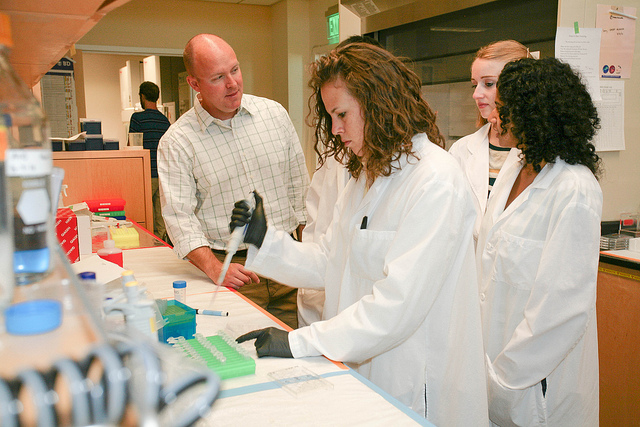The realm of biophysics represents an intriguing intersection between biology and physics. An MSc in Biophysics equips students with a robust foundation in both theoretical concepts and practical skills, rendering them well-prepared for diverse career trajectories spanning academic research, healthcare, and industrial applications. As graduates transition from the lab bench to industry, it is essential to delineate the multifaceted scope of this discipline and the myriad of opportunities it presents.
First and foremost, an MSc in Biophysics encompasses a broad spectrum of foundational knowledge. Students are immersed in complex topics such as molecular dynamics, protein folding, and the biophysical characterization of biomolecules. These subjects necessitate a solid grounding in physical chemistry, thermodynamics, and statistical mechanics. A key advantage of this interdisciplinary approach is that it cultivates a nuanced understanding of how physical principles govern biological systems. This foundation is pivotal for those aspiring to tackle high-stakes problems in areas such as drug design or molecular diagnostics.
Beyond the core curriculum, students can engage in specialized electives that align with their professional interests. For instance, courses might explore nanobiotechnology, structural biology, or computational biophysics. These subjects empower students to harness cutting-edge technologies, such as single-molecule imaging or high-throughput sequencing, which are paramount in the contemporary landscape of biomedical research. Exposure to such advanced methodologies fosters an innovative mindset, essential for careers in both academia and industry.
Moreover, practical laboratory experience is indispensable in an MSc program. Integration of hands-on training, often in state-of-the-art facilities, enables students to apply theoretical knowledge to real-world scenarios. This includes mastering techniques such as spectroscopy, chromatography, and microscopy. Enhanced technical proficiency not only supports research endeavors but also augments a graduate’s attractiveness to potential employers—particularly in industries like pharmaceuticals or biotechnology, where laboratory expertise is critical.
Furthermore, the analytical skills honed through rigorous data analysis are paramount. Biophysics students develop proficiency in bioinformatics tools and software, which are indispensable for analyzing complex biological data sets. As industries increasingly depend on data-driven decision-making, the ability to extract meaningful insights from vast quantities of information positions graduates favorably in job markets that demand both scientific acumen and analytical dexterity.
The transition from the lab to the industry is exemplified by the myriad career options available to biophysics graduates. Consequently, one might contemplate roles as research scientists, project managers, or regulatory affairs specialists. In research settings, biophysicists may lead efforts toward drug development, scientifically validating novel therapeutic approaches. Such initiatives often entail collaborative engagements with multidisciplinary teams, underscoring the significance of communication skills developed during graduate studies.
In addition to research positions, graduates may also find careers in the medical device or diagnostics sectors. The application of biophysical principles in the development and testing of novel medical technologies illustrates the far-reaching implications of this discipline. Work in these fields often necessitates collaboration with engineers, clinicians, and business professionals, reinforcing the interplay of diverse expertise that characterizes the biophysics industry landscape.
Moreover, the burgeoning fields of synthetic biology and bioengineering present exciting avenues for MSc graduates. The application of physical principles to the engineering of biological systems offers substantial potential for innovation. In these roles, graduates leverage their biophysical understanding to design and optimize novel biomaterials or therapeutic systems, enhancing the efficacy of treatments while considering ethical implications.
Furthermore, the necessity for continued education and professional development warrants attention. Many graduates opt to pursue doctoral degrees, thereby deepening their expertise and enhancing their career prospects. Academic pathways provide avenues for exploratory research, which may culminate in significant contributions to scientific literature. Additionally, involvement in academic institutions can facilitate networking opportunities, linking graduates with influential researchers and industry leaders.
On the other hand, pursuing a career in science communication may appeal to those with a passion for disseminating scientific knowledge. The ability to convey complex biophysical concepts to diverse audiences is increasingly vital, particularly as science becomes ever more integral to societal decision-making. Biophysics graduates can engage with the public through outreach programs, journalism, or policy formulation, bridging gaps between scientific insight and public comprehension.
Moreover, as industries confront evolving challenges such as antimicrobial resistance or environmental sustainability, the versatility of an MSc in Biophysics becomes distinctly evident. Graduates are equipped to engage in interdisciplinary research, collaborating with experts in environmental science, engineering, or public health to devise innovative solutions. Such endeavors underline how biophysics transcends traditional disciplinary boundaries, fostering multifaceted approaches to contemporary issues.
In essence, an MSc in Biophysics opens a treasure trove of career opportunities, marked by diverse roles across healthcare, research, and industry. Graduates emerge not only with a solid scientific foundation but also with the critical thinking, technical prowess, and collaborative skills necessary to navigate the complexities of the modern workplace. The convergence of biology and physics not only equips students with the tools to understand the intricacies of life at the molecular level but also positions them as pivotal contributors to advancements in biotechnology, medicine, and beyond.
Thus, the relentless pursuit of knowledge in an MSc in Biophysics not only enhances individual career prospects but also fosters significant contributions to society, culminating in transformative impacts on health, technology, and the environment. As graduates embark on their professional trajectories, the synergy of their training within the dynamic realms of science and industry will undoubtedly yield profound ramifications for both their careers and the broader global community.








